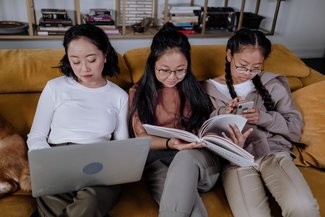
Girls Speak
Agenda Alliance's campaign to ensure girls and young women facing inequality, poverty and violence get the support and protection they need.

26 Sep 2022
New figures obtained by the charity Agenda reveal that during the school year 2020/21 girls from a dual heritage, mixed white and Black Caribbean background were excluded at three times the rate for white British female pupils.
Agenda received the data after a Freedom of Information request to the Department for Education in a follow-up to official figures on school discipline for 2020-21. The overall number of permanent exclusions decreased from just over 5,000 in 2019/20 to slightly under 4,000 in 2020/21. But this new data shows:
The figures apply to children in education in England from the age of 4 to 18. The year 2020/21 saw severe disruption due to covid but both permanent exclusions and suspensions continued throughout.
The new information released to Agenda also reveals that:
The suspension rate for this specific ethnic group of girls is higher than any other group, compared to other white British female pupils. However, in the same year, mixed white and Black Caribbean girls were also disproportionately suspended (almost twice the rate) compared to their white British counterparts.
Overall, during the academic year 2020-21 suspensions for girls increased by 20%, for boys by 11%. A suspension can be anything from part of a day to 45 days in one year. The most common reason recorded for both exclusion and suspension was ‘persistent disruptive behaviour’.
In November, Agenda will publish a full report, ‘Girls Speak’ focusing on the experiences of girls and young women in education and public services.
Commenting on the devastating impact of exclusions on children, Indy Cross, Chief Executive of Agenda, said:
"Kicking a child out of school closes doors to opportunities and can define the child’s life. School serves a vital social purpose and should provide a safe space for girls, especially those who have suffered trauma, such as domestic abuse, sexual violence, criminal exploitation and racism.
It’s devastating to see that suspensions and exclusions for girls from some minoritised communities continue at a troublingly high rate. It seems that discipline in school has been felt most sharply by mixed white and Black Caribbean girls and girls from Gypsy and Roma communities. And if we’ve learnt anything from cases like the girl known as ‘Child Q’, we know discriminatory treatment based on racial and gender stereotypes happens too often.
We must do better than this. We call on the Government to be transparent about these figures, alongside its exclusions data. It’s just one way to start addressing the racial disparities."
Ebinehita Iyere, Founder of Milk Honey Bees, which supports excluded Black and mixed white and Black African and Caribbean girls and those at risk of exclusion, said that girls themselves are the ones with the solutions:
"There are many underlying factors impacting higher exclusion rates for these girls. One factor is lack of understanding of their wellbeing and needs. The greater a school’s proportion of white and Black Caribbean and Black girls, the higher the likelihood of punitive exclusionary discipline in response to student behaviours deemed disruptive and problematic.
‘Adultification’ means unfair assumptions are made about girls’ behaviour and they’re routinely treated too harshly rather than having their wellbeing and specific needs addressed.
But there are some solutions: research and training within schools led by specialist organisations, creating safe spaces and most importantly, giving girls a voice. We need to hear from mixed white and Black Caribbean and Black girls as they have the solutions."
One sixteen-year-old M who has been excluded said,
"School don’t take time to hear [me] and give me a voice to speak. I feel like school is just quick to kick me out and not understand me… For me, I don’t want to go back because they have already made me feel like I won’t make it."
While J, another sixteen-year-old, said,
"Being kicked out of school made my life a hundred times worse… I felt misunderstood and alone… Not understanding mixed black and black girls is a choice that impacts us for the rest of our lives."
Responding to the high rates of suspension among Gypsy/Roma girls, Yvonne MacNamara, CEO of the Traveller Movement commented,
"School exclusions have a profoundly negative impact on children, reducing feelings of self-esteem and self-worth, and creating barriers to educational attainment… The Government has long known that rate of exclusions are far too high – this must now be met with the political will to do something about it."
For more information,
Contact Philippa Budgen: philippa@philippabudgen.com